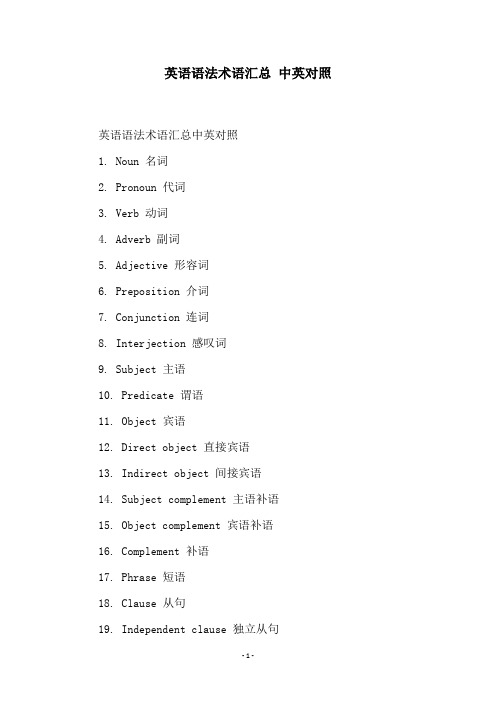10. verb & verb phrase
10-Lecture-10-Verb-and-Verb-Phrase

a) be : Used to help the main verb to form the progressive aspect and
the passive voice.
perfective progressive aspect.
The car has arrived. The guests have been waiting for quite a long.
2022/1/18
Lecture 10 Verbs & Verb Phrases
7
第7页,共35页。
b. Modal Auxiliaries
③ She happened to be met in the street by the boy. ④ I seemed to hear a voice in the distance. ⑤ She doesn’t seem to be disappointed.
2022/1/18
Lecture 10 Verbs & Verb Phrases
❖Auxiliaries fall into three categories:
a.
Primary auxiliaries
b.
Modal auxiliaries
c.
Semi-auxiliaries
基本助动词
情态助动词 半助动词
2022/1/18
Lecture 10 Verbs & Verb Phrases
1) Verbs of existence, e.g. act (foolish), appear (tired), be, become, continue (fine), grow, prove, remain, seem, sit (pretty), stand, turn…
英语语法框架及10词类简介(16张)

verb(动词)
词性缩写:v. 常见的动词:get、do、play
adverb(副词)
词性缩写:adv. 常见的副词:next、much、back
adjective(形容词)
词性缩写:adj. 常见的形容词:good、fast、hot
preposition(介词)
词性缩写:prep. 常见的介词:at、in、on
英语语法框架
10种词性、9种成分、8种句型
10种词性
注意:很多单词有很多个词性,会在不同情况下使用不同词性
1、noun(名词) 2、pronoun(代词) 3、numeral(数词) 4、article(冠词) 5、verb(动词)
6、adverb(副词) 7、adjective(形容词) 8、preposition(介词) 9、conjunction(连词) 10、interjection(感叹词)
复合句:
1)名词性从句 2)定语从句 3)状语从句
总结
谢谢观看
subject(主) predicate(谓) object(宾)
attribute(定语) adverbial(状语) object complement(宾补)
subject complement(表) double object(双宾) Apposition(同位)
8种句型
简单句:*
1)主+谓 2)主+谓+宾 3)主+系+表 4)主+谓+双宾 5)主+谓+宾+宾补
noun(名词)
词性缩写:n. 常见的名词:apple、cat、China
pronoun(代词)
词性缩写:pron. 常见的代词:we、that、all、who
十大词类的缩写

十大词类的缩写
在语言学中,词类是指一组具有相同语法和语义特点的单词。
常见的词类包括名词、动词、形容词等等。
为了方便起见,很多语言学家会使用缩写来表示不同的词类。
以下是十大词类的缩写:
1. Noun(名词)
缩写:n.
2. Verb(动词)
缩写:v.
3. Adjective(形容词)
缩写:adj.
4. Adverb(副词)
缩写:adv.
5. Pronoun(代词)
缩写:pron.
6. Preposition(介词)
缩写:prep.
7. Conjunction(连词)
缩写:conj.
8. Interjection(感叹词)
缩写:int.
9. Article(冠词)
缩写:art.
10. Numeral(数词)
缩写:num.
除了以上十大词类,还有一些特殊的词类,如助动词、情态动词、不定式等等。
它们也有自己的缩写,通常是由英文单词的首字母组成。
缩写的使用可以简化语言学研究中的表达,同时也方便学生在写作或者阅读时快速了解各种词类的含义。
因此,熟练掌握这些词类的缩写是非常有必要的。
英语语法术语汇总 中英对照

英语语法术语汇总中英对照英语语法术语汇总中英对照1. Noun 名词2. Pronoun 代词3. Verb 动词4. Adverb 副词5. Adjective 形容词6. Preposition 介词7. Conjunction 连词8. Interjection 感叹词9. Subject 主语10. Predicate 谓语11. Object 宾语12. Direct object 直接宾语13. Indirect object 间接宾语14. Subject complement 主语补语15. Object complement 宾语补语16. Complement 补语17. Phrase 短语18. Clause 从句19. Independent clause 独立从句20. Dependent clause 依从从句21. Simple sentence 简单句22. Compound sentence 复合句23. Complex sentence 复杂句24. Compound-complex sentence 复合复杂句25. Active voice 主动语态26. Passive voice 被动语态27. Present tense 现在时28. Past tense 过去时29. Future tense 将来时30. Present perfect tense 现在完成时31. Past perfect tense 过去完成时32. Future perfect tense 将来完成时33. Simple present tense 简单现在时34. Simple past tense 简单过去时35. Simple future tense 简单将来时36. Present progressive tense 现在进行时37. Past progressive tense 过去进行时38. Future progressive tense 将来进行时39. Present perfect progressive tense 现在完成进行时40. Past perfect progressive tense 过去完成进行时41. Future perfect progressive tense 将来完成进行时42. Conditional sentence 条件句43. Zero conditional sentence 零条件句44. First conditional sentence 一般条件句45. Second conditional sentence 虚拟条件句46. Third conditional sentence 过去虚拟条件句47. Imperative mood 祈使语气48. Subjunctive mood 虚拟语气49. Infinitive 不定式50. Gerund 动名词51. Participle 分词52. Present participle 现在分词53. Past participle 过去分词54. Relative clause 关系从句55. Defining relative clause 定语从句56. Non-defining relative clause 非限制性定语从句57. Compound relative pronoun 复合关系代词58. Indefinite pronoun 不定代词59. Reflexive pronoun 反身代词60. Demonstrative pronoun 指示代词61. Interrogative pronoun 疑问代词62. Relative pronoun 关系代词63. Possessive pronoun 物主代词64. Indefinite article 不定冠词65. Definite article 定冠词。
role造句简单

role造句简单1. Noun Role:* English: "The detective played a crucial role in solving the mysterious case."* Chinese: "这位侦探在解决这个神秘案件中扮演了至关重要的角色。
"2. Verb Role:* English: "During the workshop, participants were asked to role-play different conflict resolution scenarios."* Chinese: "在研讨会上,参与者被要求模拟不同的冲突解决情景。
"3. Noun Role:* English: "In the ecosystem, bees play a vital role in pollination."* Chinese: "在生态系统中,蜜蜂在传粉中发挥着至关重要的作用。
"4. Verb Role:* English: "To teach empathy, the teacher had the students role-reverse and imagine themselves in someone else's shoes."* Chinese: "为了教授同理心,老师让学生们反转角色,想象自己站在别人的角度看问题。
"5. Noun Role:* English: "The CEO's leadership played a key role in the company's successful expansion."* Chinese: "首席执行官的领导起着公司成功扩张的关键作用。
新编英语语法教程第五版10 Verb and verb phrase

Be quiet. I’m thinking (= giving thought
to a problem).
2021/6/15
14
There are also cases of a special polite use of the progressive with verbs like want, hope, wonder.
2021/6/15
4
Auxiliaries fall into three categories: primary auxiliaries, modal auxiliaries and semi-auxiliaries.
a) Primary auxiliaries: be, do, have. Without lexical meanings of their own, these auxiliaries have only grammatical functions or grammatical meanings.
a) Verb + preposition e.g. The police are looking into the case.
b) Verb + adverb particle e.g. The meeting has been called off.
c) Verb + adverb particle + preposition
e.g. I can taste pepper in it.
I’m tasting this soup.
Attitudinal verbs such as think, imagine, understand are stative verbs, but they can occasionally be used dynamically to express different meanings, e.g.
10种词性
英语单词的词性【10种词性】一.词性分类1.名词noun[n.]2.代词pronoun[pron.]3.数词numeral[num]4.冠词article[art.]5.动词verb[v.]6.副词adverb[adv.]7.形容词adjective[adj.]8.介词preposition[prep.]9.连词conjunction[conj.] 10.感叹词interjection[int.]二.对每种词性有个了解综述:十种词性除去感叹词,组成九种成分,造出八类句子。
1.名词按照可不可数分为:可数名词和不可数名词。
可数名词又分为具有固定形状的物体,如:boy、dog、flower...和度量衡单位,如:hour、cent、pound...不可数名词分为物质名词{没有固定形状,如:water、air...}、抽象名词{看不到,摸不着,没有具体形状,如:idea}、动名词{具有动态美的名词}、专有名词。
2.代词分类:人称代词、物主代词、反身代词、指主格/宾格形容词性物主代词/名词性物主代词myself示代词、疑问代词、不定代词、相互代词、关系this why some、any each other who、whom代词、连接代词。
补充:三种人称:第一人称:我、我们;第二人称:你、你们;第三人称:他、她、它、他们英语表达顺序:先说你,接着是他,最后是我。
You,he and me.3.数词分类:基数词(1,2,3,...1,000... 从右往左数,每三位加一个逗号),序数词(第一、第二、第三...)4.冠词分类:定冠词the、不定冠词a/an、零冠词(即不加冠词)补充:如何区别the/a/an:(两步走)先考虑是单数还是复数,再考虑是特指还是泛指The的含义:表示这个/那个,或者这些/那些,表特指。
A通常是在放在辅音字母开头的单词前,an通常是放在语音字母开头的单词前。
综上所述:单数就是a/an,复数就是-s(常规的);特指就加the,泛指就是零冠词。
动词大全动词英语词汇全解析
动词大全动词英语词汇全解析动词(Verb)是语言中的一种词类,用于表达人、事、物的动作、状态或存在等概念。
在英语中,动词的种类繁多,不同的动词具有不同的用法和含义。
本文将为您提供动词的大全,并对其中一部分常用动词进行英语词汇解析,帮助您更好地理解和运用这些动词。
一、动词大全下面是一个包含各种类型动词的动词大全:1. 不规则动词(Irregular Verbs):如 go(去),come(来),eat (吃)等。
2. 行为动词(Action Verbs):如 run(跑),jump(跳),swim(游泳)等。
3. 状态动词(State Verbs):如 be(是,处于),have(有)等。
4. 助动词(Auxiliary Verbs):如 do,have,be等。
5. 不及物动词(Intransitive Verbs):如 sleep(睡觉),sit(坐)等。
6. 及物动词(Transitive Verbs):如 eat(吃),drink(喝)等。
7. 双宾语动词(Double Object Verbs):如 give(给予),buy(买)等。
8. 反身动词(Reflexive Verbs):如 wash(洗)oneself,dress(穿衣)oneself等。
9. 连系动词(Linking Verbs):如 be(是),seem(似乎)等。
10. 情态动词(Modal Verbs):如 can(能),must(必须)等。
二、常用动词解析1. Go(去)- 词性:不规则动词(Irregular Verb)- 用法:表示离开或移动到某个地方- 例句:I go to school every day.(我每天去学校。
)2. Eat(吃)- 词性:行为动词(Action Verb)- 用法:表示进食或吃东西- 例句:I eat breakfast at 7 o'clock.(我7点吃早餐。
)3. Be(是,处于)- 词性:状态动词(State Verb)- 用法:表示存在、状态或性质等- 例句:She is a teacher.(她是一名教师。
小学英语必备10大语法知识点
小学英语必备10大语法知识点1. 名词(Nouns):名词用于指示人、动物、事物或抽象概念,可以分为可数名词(countable nouns)和不可数名词(uncountable nouns)。
可数名词可以具有单数和复数形式,而不可数名词通常只有单数形式。
2. 代词(Pronouns):代词用来代替名词,以避免重复。
常见的代词包括主格代词(subject pronouns)、宾格代词(object pronouns)、所有格代词(possessive pronouns)和指示代词(demonstrative pronouns)。
3. 动词(Verbs):动词表示动作、状态或存在。
动词可以分为及物动词(transitive verbs)和不及物动词(intransitive verbs)。
及物动词需要有一个宾语来完成意思,而不及物动词不需要。
4. 形容词(Adjectives):形容词用来描述名词的特征或性质。
形容词通常在名词前面或后面使用,用来增添描述性。
5. 副词(Adverbs):副词用来修饰动词、形容词、副词或全句。
副词通常用来表达时间、地点、方式、程度等概念。
6. 冠词(Articles):冠词用来指示名词的范围和特定性。
英语中有三种冠词:定冠词(the)、不定冠词(a/an)和零冠词(不使用冠词)。
7. 介词(Prepositions):介词用来表示位置、方向、时间、原因等关系,常与名词或代词连用,构成介词短语。
8. 时态(Tenses):时态表示动作发生的时间。
英语中常见的时态包括一般现在时、一般过去时、一般将来时等。
9. 动词的形态变化(Verb Conjugation):动词的形态变化包括单数和复数、一般现在时第三人称单数、动词原形和过去式等。
10. 句型(Sentence Patterns):句型指句子的基本结构,如肯定句、否定句、疑问句、祈使句等。
这些语法知识点是小学英语学习的基础,学好这些知识点能够帮助学生正确理解和使用英语,打下扎实的语言基础。
英语基础性十类词性分类及用法(精华)
词类又叫词性,英语单词根据其在句子中的功用,可以分成十个大类。
1.名词noun n. student 学生2.代词pronoun pron. you 你3.形容词adjective adj. happy 高兴的4.副词 adverb adv. quickly 迅速地5.动词verb v. cut 砍、割6.数词numeral num. three 三7.冠词article art. a 一个8.介词preposition prep. at 在...9.连词conjunction conj. and 和10.感叹词interjection interj. oh 哦前六类叫实词,后四类叫虚词。
名词复数的规则变化名词的格在英语中有些名词可以加“‘s”来表示所有关系,带这种词尾的名词形式称为该名词的所有格,如:a teacher’s book。
名词所有格的规则如下:1)单数名词词尾加“'s”,复数名词词尾没有s,也要加“'s”,如the boy‘s bag 男孩的书包,men’s room 男厕所。
2)若名词已有复数词尾-s ,只加“'”,如:the workers’ struggle工人的斗争。
大多数代词具有名词和形容词的功能。
英语中的代词,按其意义、特征及在句中的作用分为:人称代词、物主代词、指示代词、反身代词、相互代词、疑问代词、关系代词、连接代词和不定代词九种人称代词的用法:I saw her with them, at least, I thought it was her.我看到她和他们在一起,至少我认为是她。
(her做宾语,them做介词宾语,her作主补)a. -- Who broke the vase?--谁打碎了花瓶?b. -- Me.--我。
并列人称代词的排列顺序1) 单数人称代词并列作主语时,其顺序为:第二人称第三人称第一人称youhe/she; itI如:You, he and I should return on time.2) 复数人称代词作主语时,其顺序为:第一人称第二人称第三人称weyouthey反身代词指示代词指示代词分单数(this / that)和复数(these / those)两种形式,既可作限定词又可做代词,疑问代词指人:who, whom, whose指物: what既可指人又可指物: which冠词是位于名词或名词词组之前或之后,在句子里主要是对名词起限定作用的词。
- 1、下载文档前请自行甄别文档内容的完整性,平台不提供额外的编辑、内容补充、找答案等附加服务。
- 2、"仅部分预览"的文档,不可在线预览部分如存在完整性等问题,可反馈申请退款(可完整预览的文档不适用该条件!)。
- 3、如文档侵犯您的权益,请联系客服反馈,我们会尽快为您处理(人工客服工作时间:9:00-18:30)。
Dynamic verbs can be subclassified into three categories: *durative verbs *transitional verbs *momentary verbs These verbs normally admit of both the progressive and the non-progressive aspect.
The Boeing 747 is taking off. The queen is dying. The train is arriving at platform 4. I am stopping the car at this garage.
表短暂动作动词,如hit, jump, nod, kick, fire, wink, open等用进行体表示动作的不断重复。
English main verbs have two finite forms (ie the present tense and the past tense) and three nonfinite forms (ie the infinitive, the –ing participle and the –ed participle). Finite verbs are marked for tense, and nonfinite verbs have no tense distinctions.
表持续动作动词,如 drink, eat, snow,自然 可用于进行体。
It has been snowing for 3 hours.
表改变或移动的动词,如arrive, die, fall, lose, stop, land, leave等,他们的一般时表示到达 界限,进行体表示接近达到界限,但还处于 短暂的过渡。
注意:跟同源宾语(cognate object)的动词是 及物动词。
She died a glorious death. Last night I slept a peaceful sleep and dreamed a happy dream. She sat there, thinking great thoughts. to live a happy and comfortable life
According to lexical meaning, main verbs can be dynamic and stative. Dynamic verbs are verbs that refer to actions. Stative verbs are verbs that refer to state, i.e. to a relatively stable state of affairs.
We chose him deputy to the National People’s Congress. I interpreted her answer as a refusal. Make yourself at home. They were doomed to die out. The poor Soapy imagined his parted parents to come back to have dinner with him. His equivocal words made me completely confused.
Mary is being tired. The neighbors are being friendly. Tina is resembling her mother more and more. 进行体与比较结构连用,把原来的静态意义变成过 程意义。 I need some spectacles. I am not seeing things so well. --- Did you hear any bell ring just then? --- No, I cannot hear anything. --- There it goes again. --- I am hearing it now. 进行体与非进行体含义不变 My back aches / is aching. I am hoping you will come.
A survey of tense, aspect, voice and mood
Tense is a grammatical form associated with verbs that tells of the distinctions of time. Aspect as a grammatical term indicates whether an action or state at a given time is viewed as complete or incomplete.
Intransitive verbs (Vi)
He discriminates in favor of his relatives. Men may meet but mountains never. He strongly objected to the plan. Seldom do people complain about high prices.
Chapter 10 Verb & Verb Phrase
Basic Clause Types
SV He gave them a glance.
SVO
SVOC
He treats the cat badly.
He loves music.
SVOO
SVC
He will live in Beijing.
比较:非习语形式 & 习语形式;自由组合 & 成语动词 (P115) come in & give in send someone away & turn down someone come with me & come across a problem receive sth from sb & hear from sb run away with sth & come up with an answer
Monotransitive verbs
He denied having used violence. Never cast your pearls before swine.
Ditransitive verbs
The tribute accorded him was fully deserved.
Present Tense
had best, turn out to
(see P210)
Main / Notional verbs
Transitive verbs (vt.)
The prime suspect admitted having kidnapped the boy. He is so conceited as to disdain to listen attentively to anyone’s views. In no time he acknowledged it to have been done the day before. The leader from the central government is supervising the workers building the railway line. She began to wish her marriage finished in no time.
Linking verbs
be, become, get, turn, remain, stay, look etc. He has got accustomed to his new duties. The market remained depressing. The fabric feels soft.
Single-word verbs & phrasal verbs
Single-word verbs
I want to torment her with indifference.
Phrasal verbs (3+2 types)
Did they get through the work in the morning? The enemy gave in. We don’t go in for that kind of thing. She was addicted to alcohol and made a mess of her life. The house has changed hands several times.
modal aux. verbs: can/could, may/might, will/would, shall/should, must, ought to, dare/dared, need, used to
An empty sack cannot stand upright.
Main verbs Word meaning
Stative verbs Single-word verbs
Word formation
Phrasal verbs
Primary auxiliary verbs: be, have, do
